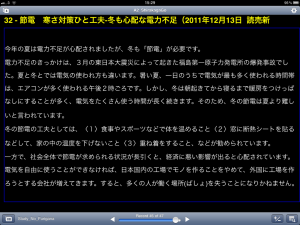Joseph – Advanced Japanese : a case study
In February 2012 I was asked to teach a boy aged 18, who had studied Japanese in one of the most prestigious private schools in the UK.
He got A* for GCSE, 99% for AS, but 60% for A. The main reason for this low mark was a failure to do well in two essays.
Thus, the aim of the lessons was to enable him to pass this exam with as high a mark as possible at the end of this May. The level assessment showed that his knowledge of kanji (Chinese characters) was beyond A2, but he was very weak at organising his essays. Based on this we set out four major targets to achieve. They were to develop his essay-writing skills, to increase his range of vocabulary, to be able to employ specific grammatical constructions , and to practise translating from English to Japanese.
- First of all, we discussed which two essays he would like to write in the exam so that he could prepare for these in advance. We agreed that he would write about one of the cities in Japan and “Tokkyo no shina” from Hoshi Shinichi’s short story, for which we produced two lists of vocabulary. It became clear that he tended to go off on a tangent in the middle of essays so that his argument got very confused.
We scrutinized each of his essays to find out where he started going off on a tangent. At the initial stage he failed to understand where he started to become illogical, so I had to draw diagrams to show this. After some sessions, he began to realise this bad habit, and became aware of this deviation.
- After a month he understood the two essay topics well so we started reading one 400-word or so long article per lesson.
This was written for Japanese students aged between 12 and 15. This equipped him not only with a wide range of vocabulary relevant to recent Japanese issues such as the low birthrate and earthquake-related incidents, but also an awareness of how each article is organised. In addition, he could observe how causative/passive/potential constructions were employed to deliver well-written articles.
- These Japanese newspaper articles were translated by him into English first, which he found rather easy. Then without looking at the original Japanese article, he practised translating his English into Japanese.
This method worked better than just translating an English article, a Japanese version of which he had never read. We studied about 20 articles, which meant that we dealt with 20 recent Japanese issues, and he learned about 1200 new words from this study.
The last week of this programme was for him to try the past A2 exam papers, and from my point of view, we completed the task very successfully. The result of this is summarised in an email from his father below.
‘Firstly thank you for your excellent work with Joe. He feels so much stronger in the subject, and importantly he also very much enjoys learning with you.
To be honest he – and we – are thinking mostly about the exam next week rather than what comes after. But personally I think there is indeed value in strengthening his communication / speaking skills before he goes to Tokyo. I just haven’t explored with him what he would like to do on this, or indeed discussed his own summer holiday plans!
Let’s get past the exam on Tuesday, I wil discuss with him and then come back to you. Again, thank you for your support. I genuinely am very pleased indeed with how things have gone. ‘ – May 26th, 2012
The boy studied with me for about three months or for about 60 hours. He will sit the exam the day after tomorrow.
Kazuo Udagawa – May 27th, 2012. Then I received an email from him on August 17th 2012 as below.
